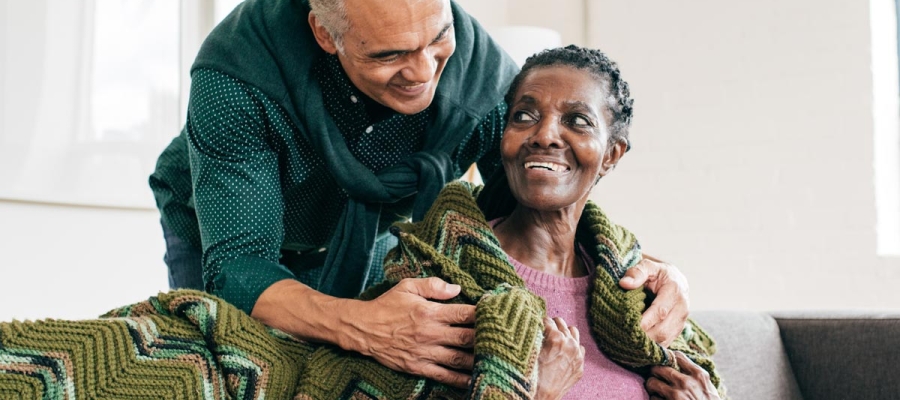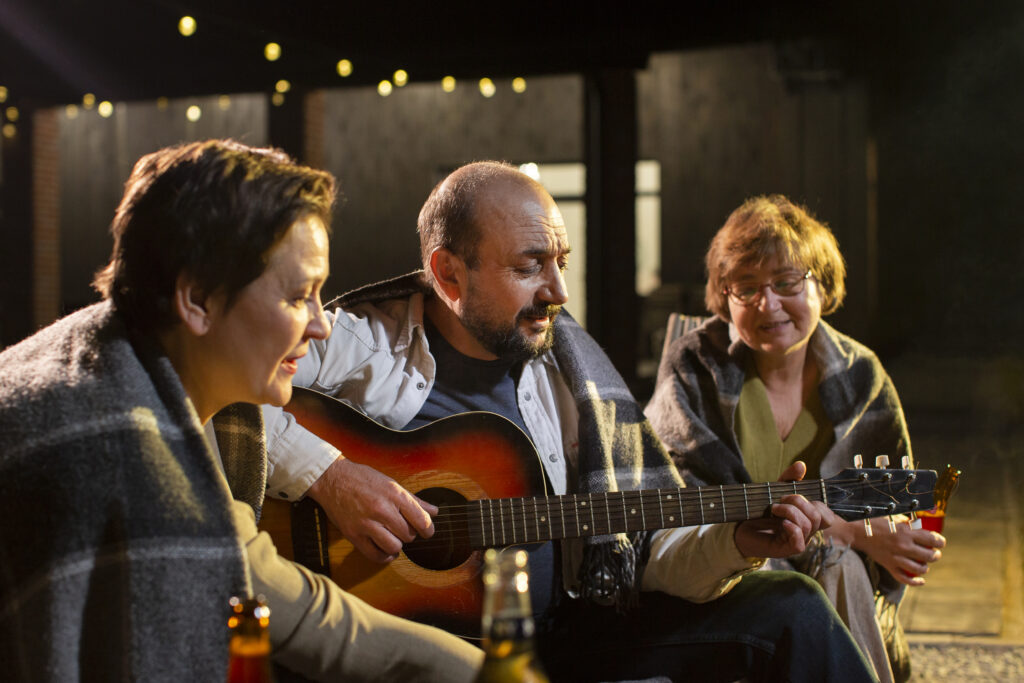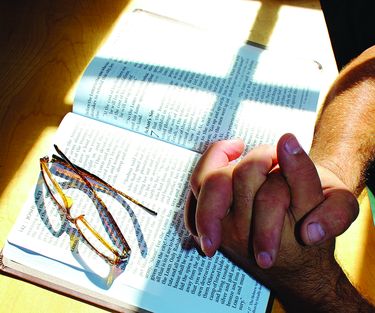The Lehigh Valley is an active community. There are plenty of popular places to visit, dine, learn, explore, and find entertainment. The South Mountain Memory Care community in Emmaus is in the Lehigh Valley, close to Allentown and other great towns. We are surrounded by activities and interests suitable for everyone.
However, one of the possible effects of dementia is that people can get easily bored. Unable to get around on their own, neglect from family members, no work or purpose in life, and other consequences of the disease can lead to boredom and listlessness. This does not have to be the case. At South Mountain Memory Care, we offer our beloved residents a unique care approach that includes daily activities to enrich all aspects of physical, cognitive, social, emotional, and spiritual functioning.
People with Alzheimer’s need to be active and do things they enjoy. However, activities they used to enjoy may become challenging for them as the disease worsens. They may have trouble deciding what to do or starting tasks. As a caregiver, you can learn how to adapt activities to make them easier and more enjoyable.
General tips for Alzheimer’s activities

Here are some ways to make activities easier and more enjoyable for a person with Alzheimer’s:
- Match the activity with what the person with Alzheimer’s can do.
- Choose activities that can be fun for everyone.
- Help the person get started with the activity.
- Decide if they can do the activity alone or need help.
- Watch to see if the person gets frustrated.
- Make sure they feel successful and have fun.
- Let them simply watch if they seem to enjoy that more.
At home with Alzheimer’s patients

To help keep days interesting and engaging for people with Alzheimer’s, try coming up with different activities to do each day. Here are some daily activities people with Alzheimer’s may enjoy:
- Cooking and baking Gather materials, measure ingredients, mix and pour, or tell someone else how to prepare a recipe.
- Exercise Take a walk together, use a stationary bike, use stretching bands, throw a soft ball or balloon back and forth, lift weights or household items such as soup cans, or follow along with exercise videos or programs for older adults.
- Music and dancing Play music, talk about the music and the artist, ask what the person with Alzheimer’s was doing when the song was popular, sing or dance to well-known songs, or attend a concert or musical program in the community.
- Pets Feed, groom, walk, or sit and hold a pet.
- Gardening Take care of indoor or outdoor plants, plant flowers and vegetables, water the plants when needed, or talk about how much the plants are growing.
- Household chores Wash dishes, set the table, prepare food, sweep the floor, dust, sort mail and clip coupons, sort socks and fold laundry, or sort recycling materials or other items.
- When family and friends visit Visitors are important to people with Alzheimer’s. The person may not always remember who the visitor is, but they often enjoy the company. Help friends and family understand Alzheimer’s before they come to visit. Remind visitors that Alzheimer’s affects behavior and personality, not just memory, and give them tips for how to communicate with a person with Alzheimer’s.
Going out with Alzheimer’s patients

Early in the disease, people with Alzheimer’s may still enjoy the same kinds of outings they enjoyed in the past. Keep going out as long as you both are comfortable. Plan outings for the time of day when the person is at their best. Keep your time away from home from becoming too long so the person with Alzheimer’s doesn’t get too tired. Some places your loved one might enjoy visiting include a:
- favorite restaurant.
- zoo or aquarium.
- park or nature trail.
- shopping mall.
- swimming pool (during a slow time of day at the pool).
- museum, theater, or art exhibits for short trips.
The person with Alzheimer’s may also enjoy going to a senior center. This type of “going out” could also be considered a form of respite care because it provides an activity for the person with Alzheimer’s and gives the caregiver a break.
Eating at a restaurant with Alzheimer’s patients

Going out to eat can be a welcome change, but it also poses some challenges. Below are some tips for eating out with a person who has Alzheimer’s.
- Choose a restaurant that the person likes, is quiet, and has quick service and an understanding staff.
- Visit restaurants during “off hours” when they’re less likely to be crowded.
- Consider going to the restaurant earlier in the day so the person is not too tired.
- Bring supplies such as utensils, a towel, and wipes that the person uses at home.
- At the restaurant, ask for a table near the bathroom.
- Help the person choose their meal if needed. Read parts of the menu or show the person a picture of the food. Suggest food you know the person likes.
- Ask the server to fill glasses half full or leave the drinks for you to serve.
- Order some finger food or appetizers before the main meal to hold the attention of the person with Alzheimer’s.
Traveling with Alzheimer’s patients

Taking a person with Alzheimer’s on a trip can be a challenge because it may make the person more worried and confused. Below are some tips that you may find helpful.
- Before you leave, talk with the person’s doctor about medicines to calm someone who gets upset while traveling.
- Think about the person’s unique needs and preferences when choosing transportation, such as a plane, train, or car. Go with the option that provides the most comfort and least anxiety.
- Pack an extra set of clothing and items they enjoy looking at or holding in a carry-on bag.
- Talk to the person about travel plans in advance, but not too far ahead if traveling makes them feel anxious.
- Do not plan too many activities, and plan rest periods.
- During the trip, follow a routine like the one you use at home. Try to have the person eat, rest, and go to bed at the same time as usual.
- Be prepared to cut your visit short if necessary.
- In case the person with Alzheimer’s gets lost, make sure they wear or have something with them that tells who they are, such as an ID bracelet.
Spiritual activities for Alzheimer’s patients

Being part of a faith community may help someone with Alzheimer’s feel connected to others and remember pleasant times. Here are some ideas to help:
- Involve the person in spiritual activities that they know well. These might include worship services, religious or other readings, sacred music, prayer, meditation, and holiday rituals.
- Tell people in the faith community about the person’s Alzheimer’s. Encourage them to talk with the person and show they still care.
- Find worship services or readings online if the person is more comfortable at home.
Holidays with Alzheimer’s patients

Caregivers of people with Alzheimer’s may worry about the extra demands that holidays make on their time and energy. Here are some suggestions to make holidays easier:
- Understand that things will be different, and be realistic about what you can do.
- Incorporate the holiday traditions of the person with Alzheimer’s.
- Create a quiet space in case the person with Alzheimer’s needs a break. Have their favorite activities or calming music in that space.
- Ask friends and family to visit. Limit the number of visitors at any one time.
- Avoid crowds, changes in routine, and strange places that may make the person with Alzheimer’s feel confused or nervous.
- Remember to enjoy yourself. Find time for the holiday activities you like to do. Ask a friend or family member to spend time with the person while you’re out.
Whatever the cause or level of your or your loved one’s memory issues, South Mountain Memory Care, with our unique culture, “small house” model, and abundance of certified caregivers, offers you the peace of mind of knowing your loved one will be cared for as if they were our family—which they are!
South Mountain Memory Care is committed to providing individualized, compassionate care to support our residents in achieving a well-balanced lifestyle. We strive to allow our residents to remain independent while emphasizing safety. Our focus is to enrich their life—mind, body, and spirit—by bringing new initiatives into their day-to-day regimen while maintaining the activities they find comfort in. South Mountain Memory Care offers the peace of mind you deserve. When it comes to those you care so deeply about, we understand because we care, too.
Adapted from nia.nih.gov/health/alzheimers-caregiving/adapting-activities-people-alzheimers-disease
